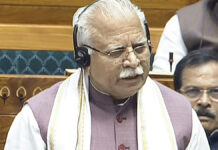
NEW DELHI, Nov 29
An agreement on tripling of renewable energy installed capacity is expected to be one of the main points of discussion at the upcoming COP28 climate meeting in Dubai. But highlighting the challenges in effecting such a transition, a new report has found that India would need an investment of about $293 billion to triple its renewable energy installed capacity by 2030.
That translates to about Rs 24 lakh crore. But a mere tripling of renewable capacity by India might not be an adequate contribution if the world is to align itself to a net-zero pathway. The International Energy Agency (IEA) net zero scenarios are contingent on India being able to do much more than just tripling its renewable capacity.
A new report by Ember, a UK-based independent think tank focused on climate affairs, notes that India had already set its sights on tripling its renewable energy capacity for 2030, much before it was acknowledged as a mandatory global goal to ensure that there is still some chance of holding global temperature rise within 1.5 degrees Celsius from pre-industrial times. India has announced its plans to reach 450 GW of renewable installed capacity by 2030, more than three times the current capacity of about 135 GW.
But if the IEA global net zero pathways are to be met, India would need to take its renewable installed capacity to about 570 GW by 2030, Ember said. That would require an additional financing of $101 billion, over and above the money required for tripling.
“This involves an extra investment of approximately $68 billion for solar, $8 billion for wind, $14 billion for storage, and $11 billion for transmission capacity additions. This brings the total investment in this scenario to around $394 billion (about 32 lakh crore),” the report said. The tripling of global renewable energy installed capacity is one of the key targets being pushed for adoption at COP28. The proposal was included in the G20 summit outcome in NEW DELHI in September and has been endorsed by about 60 countries after that.
According to IEA estimates, this singular measure has the potential to avoid about 7 billion tonnes of carbon dioxide emissions between now and 2030. Installation of new renewable energy capacity has been growing at 9-10 per cent yearly, but this would need to be almost doubled to reach the tripling target by 2030.


























